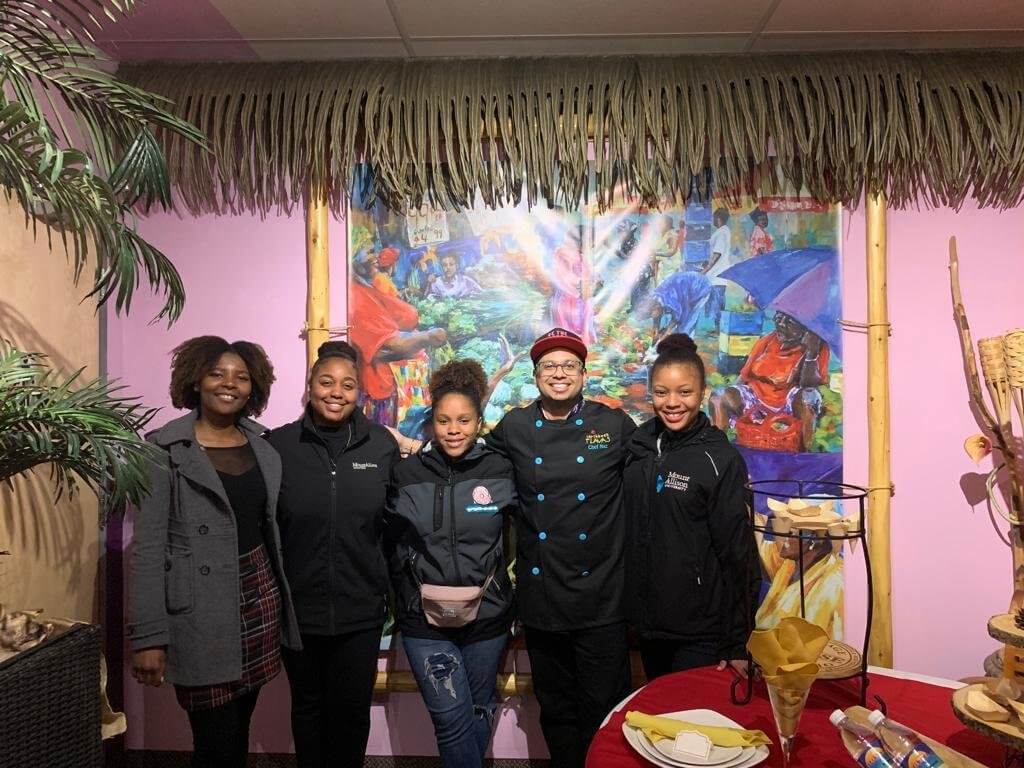
This semester, the students of GENV 4821 (A Seminar in Urban Issues) embarked on a weekend-long journey to Fredericton, N.B., to complete research on craftwork restaurants. Under the instruction of Dr. Tim Reiffenstein, students Tamlyn Mafika, Aminah Simmons, Sertara Wilkinson and Arianna Woodley conceptualized their project based on course materials and discussion surrounding authenticity, gentrification and the role of small craft businesses in defining a space. The project was further defined based on how craftwork in the restaurant industry related to the paradox of being authentic, cool, yet precarious. The text Masters of Craft by Richard E. Ocejo governed the research, and the students were able to apply his definition of craftwork (“knowledge-based manual labour”) to the restaurants studied and provided the basis for conversation with the restaurant owners.
This vlog-style project features two very different restaurants: Caribbean Flavaz and Isaac’s Way. Caribbean Flavaz is a Caribbean-Canadian fused family restaurant that offers a variety of Caribbean foods, in an ambiance that takes you on a trip to the islands. Chef Naz, the owner of one of the few restaurants of this type in Atlantic Canada, is also a highly popular DJ among celebrities like Snoop Dogg and Rihanna. This artistic expression is seen through creative elements of his dishes and his “Surprise Me” section on the menu, carnival regalia framed alongside Trinidadian market murals and driftwood, as well as the musical accompaniment that drifts through the dining area.
“You can see Naz’s passion for his craft from the way he speaks about his story and the way he interacts with his customers – almost as though they are truly family!” Sertara said in our research discussion. Aminah, the videographer of the group, noted that she felt “at home away from home” based on the collective experience at the restaurant.
Isaac’s Way also did not disappoint, as the group was charmed by the artistic components that decorated the halls of this old historic courthouse. There were paintings from local artists who support underprivileged children in the community and quotes about food from well-known authors.
Although the restaurant’s original structure was destroyed by fire and they relocated, Tabatha, the owner, made sure that her business never lost its sense of community. From the N.B.-made coffee mugs and craft beers to the spin on local dishes, every aspect of the service was customized to suit every customer. The chef, Jesse, was also instrumental in this process, and Aminah was invited behind the scenes to watch him prepare one of the first meals of the day.
“I got to go into the kitchen of Isaac’s Way! I was able to see up close and personal how the chef customized his eggs Benedict and it was amazing!” she said. “I have never been that close to a professional chef in any restaurant before, so it was pretty cool. The presentation of the food reminded me of Patterson’s here in Sackville.”
While in Fredericton, the students also visited Naru Sushi Japanese Restaurant and the Fredericton Farmers Market, which provided the opportunity to informally interview vendors about their products and whether they considered them to fall into the category of “knowledge-based manual labour.” Items represented included local fruits and vegetables, kettle corn, German cuisine, Asian cuisine, butcheries, cheesemakers, knitwork, wooden toys and so on.
Before leaving for Fredericton, a part of the research involved asking randomly selected students across the Mt. A campus about what craftwork meant to them. While most answers centred around “majorly developed hobbies,” some respondents were not entirely sure how craftwork could be defined, as they believed that a person’s craft should be left to them to define how they view the fruits of their labour.
This was quite interesting to note, as the question also re-circulated during our restaurant interviews in Fredericton – this time with different viewpoints. Both owners believed that their work was their craft, a manifestation of their knowledge through careful curation and manual labour.
“The trip was a great experience because we learned to collect and process data on our own,” said Tamlyn. “Interviewing the restaurant owners also gave us a new perspective on the restaurant business; it allowed us to step into their minds for a few moments.” In the past, this course has been used to explore the contemporary city through the lens of its craft-based economy.
Through the generous sponsorship of Experiential Learning and FutureReadyNB and contributions from the Mt. A department of geography and environment, this research was made possible this year and the students and professor would like to extend thanks to both organizations.





